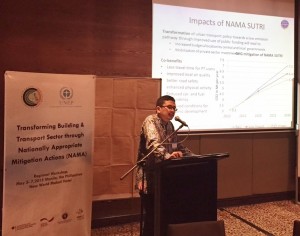Following the regional workshops on Nationally Appropriate Mitigation Action (NAMAs) in Singapore in 2013 and Vietnam in 2014, the “TRANSfer” project and the “Transport and Climate Change” project (TCC) of GIZ jointly organised with UNEP a workshop on “Transforming Building and Transport Sectors through NAMAs” held in Manila, Philippines from the 5th to 7th of May 2015. The Climate Change Commission of the Philippines hosted the event.
While in total there were 90 participants, during the Transport Specific Sessions up to 40 participants from 8 different countries discussed certain topics including the five different NAMA concepts which have been presented by ASEAN countries. The transport stream of the workshop examined how NAMAs can: (1) help sustainable transport policy development and implementation, (2) apply the concept of transformational change to t-NAMAs, and (3) enhance the knowledge on t-NAMAs worldwide, support mechanisms, and the Road to Paris COP 21. The workshop also highlighted the significance of NAMAs as an instrument for intended nationally determined contributions (INDCs) and the call for action in formulating climate activities in a bottom-up approach. Within the workshop discussion the challenges during the development and implementation of NAMA were mainly attributed to: Firstly, the data availability, which restricts an efficient MRV methodology during the NAMA implementation, and secondly, the challenge to harmonise and improve the funding mechanisms of NAMAs (national vs international). Potential approaches to tackle those challenges within the NAMA development and implementation were identified by the participants: Firstly, set up an efficient steering structure to improve coordination among stakeholders and mainstream the NAMA approach. Secondly, prioritise programmatic approaches in order to achieve transformational change, and thirdly, strengthening the involvement of the private sector from the beginning.
For more information on the key questions during each session and presentations, please find a short summary below.
Thematic sessions on Transport NAMAs:
Day 1:
Secretary Lucille Sering from the Philippines Climate Change Commission had the honour to open the workshop stating that “when we deal with climate change we have nowhere else to go but low“. She emphasised that developing country mitigation action is voluntary but imperative, followed by opening remarks from Tunnie Srisakulchairak from UNEP Regional Office for Asia Pacific and Tali Trigg from the GIZ Transport and Climate Change project.
During the first joint session on prioritising NAMAs in National Climate Strategies, Friedel Sehlleier, Climate Change Advisor at GIZ Bangkok, highlighted the importance of the transport sector and its negative impact on climate change. He also presented on why NAMAs are more than just a new label for climate-friendly sector initiatives. (Presentation on NAMA for the Transport Sector)
In the first transport specific session, participants got the latest updates on the status quo of Transport NAMAs by Friedel Sehlleier and on 2014´s Transport NAMA Report by Eric Mackres (WRI). A total of 43 Transport NAMAs were identified worldwide, of which 14 are being planned in Asia. (Presentation on Status of Transport NAMAs and Presentation of Transport NAMA Database & Transport NAMA Report 2014)
Country Presentations by the ‘Regional Newcomers to Transport NAMAs’:
How to integrate jeepney and bus operators, along with service contracting and modernised fleets, were some of the main topics discussed in the context of public transport NAMA in Manila. The key points were presented by Assistant Secretary Sherielysee Bonifacio from the Department of Transportation and Communications (DOTC). (Presentation on Transport NAMA Development in the Philippines)
How to tackle motorcycle (emissions) is part of the Transport NAMA, which will be developed in Malaysia and embedded into the National Electric Mobility Blueprint. One goal is to have 100,000 electric motorcycles deployed by the year 2020 in order to save oil and CO2 emissions and parallel to this, a phasing-out of older two-stroke vehicles. (Transport NAMA Development in Malaysia)
It´s all about the money…
The morning was followed by a ‘financing afternoon’ where transport experts and participants discussed how transport NAMAs can be financed and the importance of climate finance for sustainable transport. Transport is still underrepresented in climate finance mechanisms and can only cover a small portion of investment needs. Climate Finance needs to be used in a smart way to be effective, including a focus on more than infrastructure. (Presentation on ADB Activities Inc Transport NAMA Support Facility in Greater Mekong Subregion and Presentation on Opportunities for Transport in the GCF)
Day 2:
Transformational Change as the main driver of Transport NAMAs?
n day two, more insights on the national level were discussed including the concept of transformational change. It plays a role in NAMA by offering the possibility to change prevailing structures. The NAMA SUTRI Indonesia and Transport NAMA Vietnam highlighted how their NAMAs contribute to Transformational Change. (Presentation on Transformational Change & Paradigm Shift, Presentation on SUTRI NAMA in Indonesia and Presentation on Transport NAMA in Vietnam)
Data issues still considered as one of the main concerns
During the afternoon session, Thailand shared their experience in overcoming data issues with the transport experts and during a moderated group work and discussion. MRV for the NAMA development is still one of the biggest concerns, but it has been discussed that ASEAN member states can learn from one another with regards to the generation and management of transport emissions-relevant data. (Presentation on Experiences & Ways to Tackle Gaps in Thailand and Presentation on Overcoming Data Issues in the Transport Sector)
Day 3:
The Road to Paris – How to deal with INDCs and NAMAs?
The road to Paris and the new approach of INDCs were the focus on the third day. The roundtable discussion with speakers from Thailand, the Philippines and Indonesia shared their experiences and knowledge about developing INDCs. Participants expressed a need to better clarify the differences between INDCs and NAMAs As a transport specific wrap-up, interactive group works and ‘bus stops’ were used to discuss the main outcomes of the workshop. Participants identified their ‘take-home-messages’ for transport NAMAs on the topics: MRV, Financing, INDCs and Transformational Change.